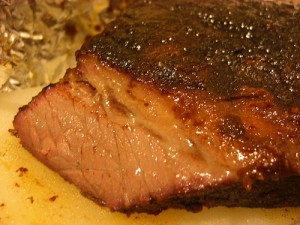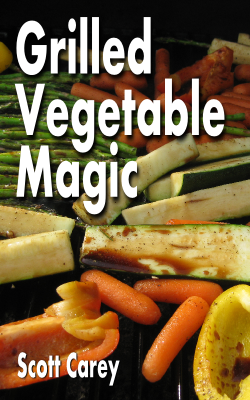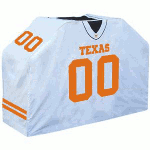
Photo by willsfca via Flickr
A brisket has historically been known to be one of the toughest cuts of meat--but when it is prepared and cooked correctly, it is on of the best tasting meats you will eat. Brisket is a favorite meat to smoke in Texas. In fact, I just got back from there and actually tried the brisket in four 5 different restaurants over three days (Rudy's in Round Rock, Duke's in Georgetown, and Black's, Smitty's, and Chisolm Trail in Lockhart). The best? In my opinion, it was Rudy's! It had the best smoked flavor of all of them, although Black's was pretty good also. Here's the secrets to cooking a great tasting brisket.
How to Choose A Good Brisket To Smoke
There are two parts to a brisket, the flat and the point. The flat section generally has less fat; the point will have considerably more. The fat on top of the brisket is called the "fat cap" and should be white in color. Look for a brisket that has at a fat cap of at least 1/4 of an inch thick; more than that is fine. Make sure the meat is a deep red color, which represents freshness. Look for fat throughout the meat. Don't pick one that has fat only on the top.
This combination deep red color and white fat of a brisket is called marbling and is the key to selecting a good brisket for smoking. The brisket is a thick cut of meat and the marbling helps keep it moist while it's being smoked.If possible, try to find a brisket that has not been frozen. A frozen brisket won't have quite as deep of a red color as a fresh brisket and the fat may be a bit darker. The brisket won't turn out as tender and juicy as a fresh cut of brisket.
One technique you can use is to lift the brisket in the middle to see how flexible it is. You'll find some that are as stiff as a board and some that bend easily. The stiff ones have probably been frozen and may not be as tender as other briskets that are more flexible. Where possible, choose one a brisket that is more flexible.
Look for a brisket that is between 8 and 11 pounds. A larger brisket takes longer to cook; the flat may end up tougher because of the longer cooking time.
Preparing The Brisket
After you've found the right brisket, get it ready the night before you want to smoke it. First, trim the fat to about 1/4 inch thick. Thicker fat will keep the smoke from penetrating as well.
After trimming the brisket, rub the brisket with mustard. This will help the rub adhere to the brisket and will help keep it tender. Surprisingly, the mustard doesn't seem to add a strong flavor to the brisket; in fact, you'll hardly notice it. Rub the mustard all over the meat, including the fat. Don't make it too thick, but enough to allow the rub to mix with it to create a paste.
After you've covered the brisket with mustard, apply the rub. Try to put on evenly, but apply it all over the entire brisket. Wrap the brisket in plastic wrap and put it in the fridge overnight.
Time to Smoke the Brisket
Take the brisket out of the refrigerator one hour before you want to put it on the smoker. Put the brisket in the smoker with the fat side up. As the fat heats, it will release oils into the brisket that will help keep it moist while it smokes.
Your smoker will need to have some method of indirect heat. You can use a grill, but will need to make sure that there is a zone that is not directly over the heat source. Otherwise, the brisket will burn. There are many smokers made just for this job, including, water smokers, propane smokers, and charcoal smokers.
You'll need to get some wood chips to use for smoking. Mesquite is a popular wood in Texas, but it can be a bit strong. I like a combination of hickory and a fruit or nut wood, such as apple, or pecan. Depending on your smoker, you can add the chips directly to the heat source, or wrap in aluminum foil and poke a few holes in the foil to allow the smoke escape. Put the foil packet on the heat source.
Cook the brisket at about 225 degrees. Plan on cooking it for an hour and 15 minutes per pound. There are many variables that can affect the temperature, including outside air temperature, wind, how many times you open the smoker, so use this as a guidelines. Smoke the brisket until it is about 180 degrees. The fat will start to marbleize at 180 degrees, so hold it at that temperature for 15-20 minutes. That will help the tenderness of the brisket.
Once an hour, use a mop sauce to baste the brisket while it is smoking. This keeps the outer part of the brisket moist and tender. Do it quickly so that you reduce the heat loss from the smoker. A mop of apple juice and olive oil will give the brisket a great flavor. You can even put this into a spray bottle and just spray it onto the brisket.
After you've cooked the brisket for 6 or 7 hours, the brisket won't absorb much more heat. Wrap it in aluminum foil and allow it it finish cooking. That will also help keep the brisket moist.
SLICING THE BRISKET
ALWAYS slice the brisket against the grain. This will make the cuts of meat very tender. Remove some of the fat left on top of the brisket to see the direction of the grain and slice against it.
Serve with your favorite barbecue sauce and see if you don't get rave reviews from your friends and family when they try your brisket! Please try this and let me know how it goes. The nice thing about brisket, is that if you do it right, you can feed a whole crowd and they'll be raving about your food!
P.S. If you want to know how the pros (and I'm talking about the ones that compete on the BBQ circuit--yes, there really is such a thing) do it, you'll want to check out Competition BBQ Secrets. It will give you all the tips and tricks to not only cook great brisket, but to do it how the winners do it!





2 comments
I have never even used a smoker, but I am going to the river at a non-electrical campsite weekend after next and I must smoke a brisket the day we get there. I can do the rub, etc the night before…but what can I use to smoke it? Are there small, portable smokers that work like the big ones? Please let me know. Thanks for all the tips!
Author
Kim,
There are a variety of smokers available, and many (maybe even most) that are non-electric and use charcoal plus wood chips. The disadvantage is that they require more tending, because you have to make sure to keep feeding them charcoal. Brisket takes a while to do, so depending on when you need to eat it, you may need to start early in the morning.
I looked around some, and although I haven’t tried this one, it may be what you are looking for. It is the Masterbuilt M7P 7-in-1 Smoker and Grill with Pan and Basket Set and is a combination propane or charcoal griller/smoker and can also be used to do a variety of other types of cooking. It looks like it could be just right for what you are wanting to do.
Just make sure you give yourself plenty of time for the brisket. I’ve done brisket that has taken 12-14 hours.